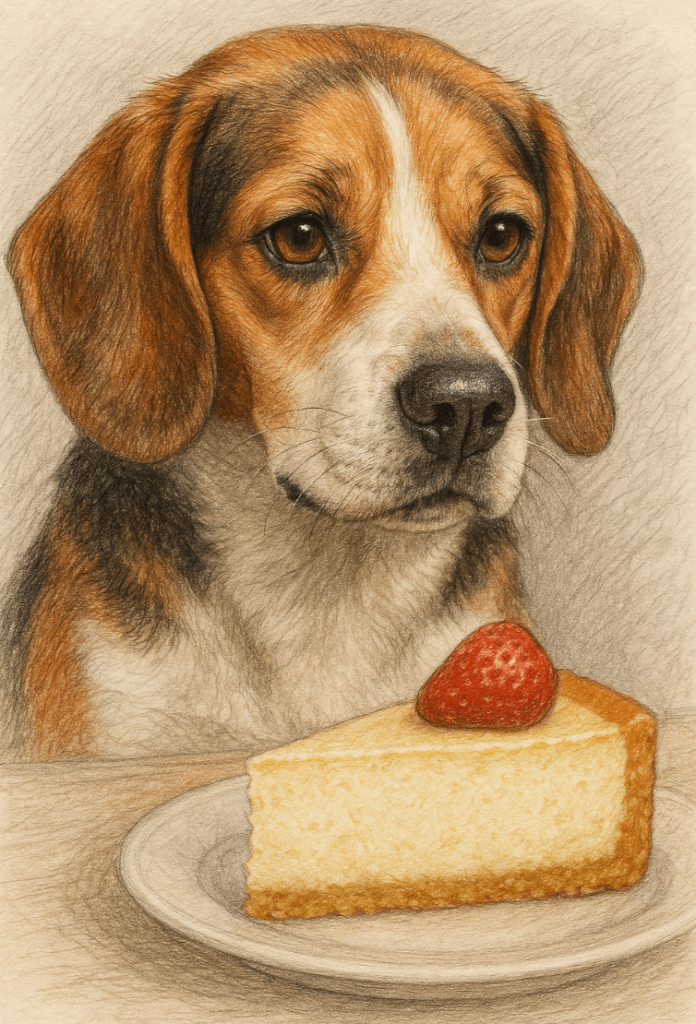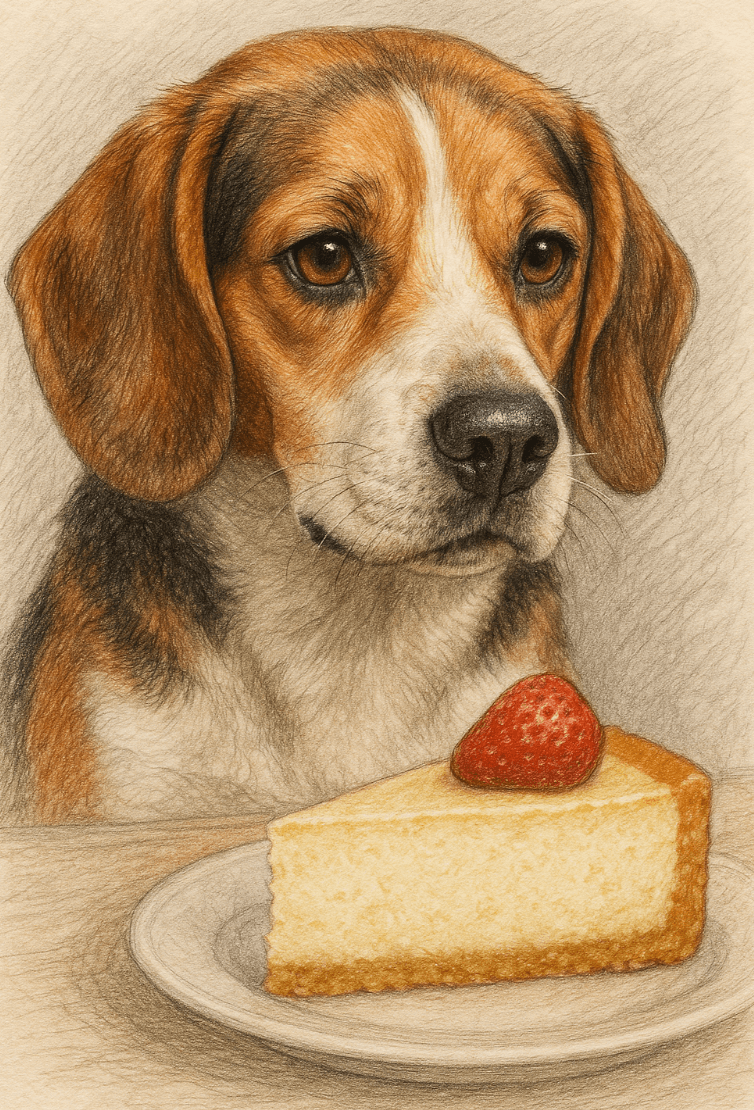Can Dogs Eat Cheesecake?
Cheesecake is a beloved dessert for humans, with its creamy texture and rich flavors. But what happens when your furry friend gives you those irresistible puppy eyes while you’re enjoying a slice? As much as we love sharing our treats with our dogs, it’s essential to consider whether cheesecake is safe for them to consume. While some ingredients in cheesecake may be harmless in moderation, others can pose serious risks to your dog’s health. In this blog post, we’ll explore everything you need to know about feeding cheesecake to your dog, including potential dangers, safer alternatives, and tips for keeping your pup happy and healthy.
Potential Risks of Feeding Cheesecake to Dogs
While cheesecake might seem like a harmless indulgence, certain components can be harmful to dogs. Understanding these risks will help you make informed decisions about treating your pet.
High Sugar Content:
Cheesecake is loaded with sugar, which can lead to weight gain, diabetes, and dental issues if consumed regularly.Dairy Sensitivity:
Many dogs are lactose intolerant, meaning the cream cheese and other dairy products in cheesecake can upset their stomachs.Toxic Ingredients (e.g., Chocolate or Nuts):
Some cheesecake varieties include chocolate, raisins, or nuts, all of which are toxic to dogs and can cause severe reactions.Fat Content:
The high fat content in cheesecake can trigger pancreatitis, a painful and potentially life-threatening condition in dogs.Artificial Sweeteners (Xylitol):
If the cheesecake contains xylitol, a common sugar substitute, it can be highly toxic and even fatal to dogs.
These risks highlight why caution is crucial when considering sharing cheesecake with your dog. Always prioritize their health over satisfying their curiosity.
Safer Alternatives to Cheesecake for Dogs
If your dog is craving something sweet or creamy, there are plenty of dog-friendly alternatives that mimic the appeal of cheesecake without the risks.
Plain Yogurt or Cottage Cheese:
These dairy options are lower in fat and sugar, making them a safer treat for dogs who tolerate lactose well.Frozen Banana Slices:
Bananas are naturally sweet and packed with nutrients, offering a refreshing and healthy snack.Peanut Butter Pupsicles:
Mix peanut butter (xylitol-free) with plain yogurt and freeze it into bite-sized treats for a fun dessert.Homemade Dog-Friendly Cheesecake:
Create a canine-safe version using ingredients like pumpkin puree, plain yogurt, and a sprinkle of cinnamon.Apple Slices with Cream Cheese:
A small serving of unsweetened cream cheese paired with fresh apple slices can satisfy your dog’s cravings safely.
These alternatives allow you to indulge your dog’s taste buds while ensuring their safety and well-being.
Check this guide 👉Can Dogs Eat Rice Cakes? Best 7 Expert Tips!
Check this guide 👉Can Dogs Eat Donuts? Best 7 Expert Tips!
Check this guide 👉Can Dogs Eat Sushi? Best 7 Expert Tips!

Safe Ingredients for Dogs | Unsafe Ingredients to Avoid |
|---|---|
Plain yogurt | Chocolate |
Pumpkin puree | Xylitol (artificial sweetener) |
Peanut butter (xylitol-free) | Raisins or currants |
Apples (without seeds) | Macadamia nuts |
Cinnamon (in small amounts) | High-fat cream cheese |
Signs Your Dog May Have Eaten Cheesecake
If your dog manages to sneak a bite—or more—of cheesecake, it’s important to watch for signs of distress or illness. Early detection can prevent complications and ensure your dog receives prompt care.
Upset Stomach:
Symptoms like vomiting or diarrhea may indicate digestive issues caused by the high fat or sugar content.Lethargy or Weakness:
A sudden lack of energy could signal a reaction to toxic ingredients like chocolate or xylitol.Excessive Drooling:
This behavior often points to nausea or discomfort after consuming rich foods.Abdominal Pain:
Signs of bloating or tenderness around the belly area may suggest pancreatitis triggered by fatty ingredients.Seizures or Tremors:
In severe cases, ingestion of xylitol or chocolate can lead to neurological symptoms requiring immediate veterinary attention.
Recognizing these signs early allows you to act quickly and protect your dog’s health.
Tips for Preventing Accidental Cheesecake Consumption
Preventing your dog from accessing cheesecake or other unsafe foods is key to avoiding potential health issues. Follow these tips to keep your pup safe.
Store Desserts Out of Reach:
Keep cheesecake and similar treats on high shelves or in closed containers where curious noses can’t find them.Supervise During Social Gatherings:
Parties or family events often involve desserts left unattended—always keep an eye on your dog during such occasions.Teach the “Leave It” Command:
Training your dog to ignore food on command can prevent accidental ingestion of harmful items.Use Pet-Proof Trash Cans:
Dispose of leftover cheesecake securely to avoid dumpster-diving incidents.Educate Family and Guests:
Inform everyone in your household or visiting guests not to feed your dog any human food without permission.
By taking these precautions, you can minimize the risk of your dog encountering harmful foods like cheesecake.
Common Mistakes to Avoid When Feeding Human Food to Dogs
Feeding human food to dogs can be tricky, as many seemingly harmless items are actually dangerous. Avoid these common mistakes to protect your dog’s health.
Assuming All Desserts Are Safe:
Just because a food is non-toxic doesn’t mean it’s healthy; desserts often contain excessive sugar and fat.Ignoring Ingredient Labels:
Not checking labels for hidden toxins like xylitol or artificial flavorings can lead to accidental poisoning.Overfeeding Treats:
Even safe snacks can cause weight gain or nutritional imbalances if given in excess. Stick to moderation.Leaving Food Unattended:
Dogs are opportunistic eaters—if left alone with food, they may gobble it up regardless of safety.Not Consulting Your Vet First:
Before introducing new foods, seek professional advice to ensure they align with your dog’s dietary needs.
Avoiding these errors ensures safer snacking experiences for your dog.
Healthier Dessert Recipes for Dogs
If you enjoy baking for your dog, try these simple recipes that mimic the fun of cheesecake without the risks.
Pumpkin Yogurt Bark:
Mix canned pumpkin puree with plain yogurt, spread it on a tray, and freeze it into bark-shaped treats.Banana Oat Cookies:
Blend mashed bananas with oats, shape into cookies, and bake until golden brown for a chewy snack.Blueberry Frozen Delights:
Blend fresh blueberries with water, pour into molds, and freeze for a refreshing summertime treat.Carrot Cake Bites:
Grate carrots, mix with whole wheat flour and egg, then bake small portions for a nutritious dessert.Sweet Potato Chews:
Slice sweet potatoes thinly, dehydrate them in the oven, and serve as crunchy, natural chips.
These recipes provide guilt-free ways to spoil your dog while keeping their health in mind.
Understanding Your Dog’s Dietary Needs
Every dog has unique dietary requirements based on factors like age, size, and activity level. Understanding these needs helps you make better decisions about their diet.
Age Considerations:
Puppies need nutrient-dense diets for growth, while senior dogs benefit from lower-calorie options to maintain weight.Breed-Specific Needs:
Large breeds may require supplements for joint health, while small breeds often thrive on calorie-dense foods.Allergies and Sensitivities:
Common allergens like dairy, grains, or certain proteins can affect digestion—identify triggers through elimination diets.Activity Levels:
Active dogs burn more calories and may need higher-energy diets compared to sedentary pets.Hydration Importance:
Ensure your dog drinks enough water daily, especially if consuming dry kibble or salty snacks.
Tailoring your dog’s diet to their specific needs promotes long-term health and happiness.
Frequently Asked Questions About Dogs and Cheesecake
Is a small bite of cheesecake okay for my dog?
A tiny bite may not harm most dogs, but it depends on the ingredients. Avoid feeding cheesecake regularly due to its unhealthy components.
What should I do if my dog eats cheesecake?
Monitor for symptoms like vomiting, diarrhea, or lethargy. Contact your vet immediately if you suspect toxicity from ingredients like chocolate or xylitol.
Are there any types of cheesecake that are safe for dogs?
Plain cheesecake made with minimal sugar and no toxic additives may be less risky, but it’s still best avoided altogether.
Can puppies eat cheesecake?
Puppies have sensitive digestive systems, so cheesecake is especially dangerous for them and should always be avoided.
How can I tell if my dog is lactose intolerant?
Symptoms include gas, bloating, diarrhea, or vomiting after consuming dairy products. Consult your vet for confirmation and dietary advice.
Prioritizing Your Dog’s Health Over Treat Temptations
While cheesecake might look tempting to share with your dog, it’s simply not worth the potential risks. From high sugar and fat content to toxic ingredients like chocolate or xylitol, this dessert poses numerous threats to your furry friend’s well-being. Instead, opt for healthier, dog-friendly alternatives that satisfy their cravings without compromising their health. By staying vigilant and educating yourself on safe feeding practices, you can ensure your dog stays happy, healthy, and tail-waggingly content. Remember, the best way to show love is through thoughtful care—and that includes resisting those pleading puppy eyes at dessert time!
Do Cats Have Taste Buds? Best 7 Expert Tips! – Discover how cats experience flavors and why their taste is so unique.
Do Dogs Have Taste Buds? Best 7 Expert Tips! – Discover how dogs experience taste, their preferences, and what it means for their diet and health.
Can Cats Taste Sweet? Best 7 Expert Tips! – Discover why cats can’t taste sweetness, how it affects their diet, and tips to keep them healthy and happy.
Can Dogs Taste Sweet? Best 7 Expert Tips! – Discover how dogs perceive sweetness, which foods are safe, and tips to manage their sweet cravings responsibly.





